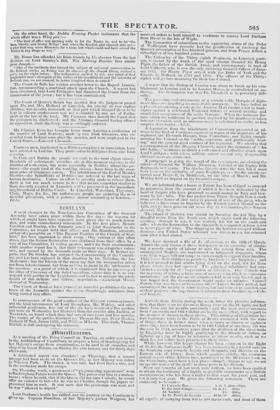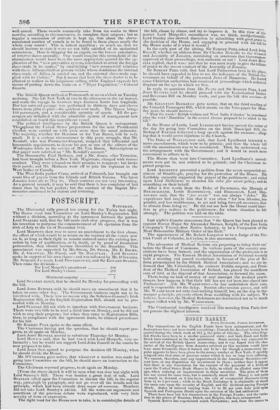Arrivals from A frica, during the week, bring the pleasing
informa- tion, that there were no slavers in Bonny river on the 2d April, nor had there been any for months previously ; and the most recent accounts *cm Canscroons and Old Calabar are to the same effect, with regard to the absenee of slavers in those rivers. This retiring of illecitimate be- fore h.eitireate trade in the Bight of Biafra, contraste4 wit h the state of' thine: there in former times, when as melte as sixteen (Sr eighteen slave osisil s have been known to be in Old Cala.bar at one time, (as was the case m 152,1, seventeen years after the abolition of the slave-trade by England,) must be highly gratifying to the friends of Africa, as lighting ttp a ray of hope in reference to future results, such as we think has not before been presented to their views.
While, however, this happy chamte has been going on in the Bight
of Bi a fr:!, the barbarous traffie Its ‘beeis in in a fearful ratio on the Southern coast towards Angola and Benguela, and likewise on the Eastern side of A frien : front which quarters, chiefly, the eno‘rmeosuees
annu m
al e x .rt of the African race, entiemed in Mr. IluXTON'S book on the Slave-trade, must have taken place—thouels strange to say, v no specific notice of the train,: in those parts in his licated.e. Since our remarks of last week were written, we have been enabled to obtain the testimony of a highly respectable commander of a British merchantman, who has been a trader to that coast for years past, and left it only last year. He gives the following statement. There are commonly to lie seen—
Ism l'abenda Bay 4 or 5 slave-ships, It: the river Congo 14 or 15 ditto, At Ambriz 10 ditto,
At St. Paul's de Loando 40 to 50 ditto, all capable of carrying from 300 to 500 slaves each, and most of them well armed. These vessels commonly take from six weeks to three months, according to circumstances, to complete their cargoes ; but so regular a succession of arrivals is kept up, that about the above- mentioned number of vessels is to be found in these places nearly the whole year round ! This is indeed appalling ; so much so, that we should hesitate to state it were we not fully satisfied of its undoubted correctness. I-fere is shipping for an export, on the lowest calculation, of 100,0(n) slaves annually. One would imagine this stronghold of the abomination would have been the more appropriate quarter for the ap- plication of the " new preventive system, calculated to arrest the foreign slave-trade in its source," by establishing " new commercial relations with those African chiefs or powers within whose dominions the internal slave•trade of Africa is carried on, and the external slave-trade sup- plied with its victims." But it seems that here the slave-dealer is to be allowed to wallow in his iniquitous calling, while England expends her means of putting down the trade on a "Niger Expedition."-- Colon ad Gazette.



























 Previous page
Previous page